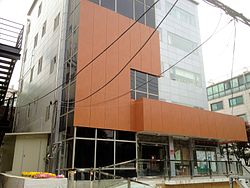공단
Industrial complex| 시리즈의 일부 |
| 경제학 |
|---|
산업단지는 기업이 사회 또는 정치 시스템이나 제도에 얽혀 이러한 시스템으로부터 수익경제를 창출하거나 지지하는 사회경제적 개념이다.이러한 콤플렉스는 사회와 개인의 최선의 이익에 관계 없이, 그리고 종종 희생을 감수하면서 자신의 재정적 이익을 추구한다고 한다.공단 내 기업은 사회적 또는 정치적 목표를 진전시키기 위해 만들어졌을 수 있지만, 대부분 목표에 도달하지 못할 때 이익을 얻는다.공단은 사회적으로 해롭거나 비효율적인 시스템을 유지함으로써 재정적으로 이익을 얻을 수 있다.
역사
이 개념은 드와이트[1] 아이젠하워 대통령이 1961년 1월 17일 고별사에서 대중화했다.아이젠하워는 군사 산업 단지라고 불리는 "민주 [1]정부에 대한 위협"을 묘사했다.이 콤플렉스는 미국 무기산업의 수익성과 군복무, 무기산업, 그리고 미국에 물품을 제공하는 다른 사업의 다양한 분야에 고용된 시민들의 수 때문에 미국 사회의 경제적, 정치적, 정신적인 영역에 "부당한 영향"을 받는 군 체제를 포함했다."복합"은 군사적 목표에 도움이 되는 다자경제의 창조와 더불어 군의 이론적 목표(평화)와 반대되는 다자주의(지속적 이익)의 목표에서 발생하는 역설에서 비롯된다.
운용
많은 경우, 공단은 특정 목적을 달성할 때, 그 목적을 추구함으로써 이익을 얻는 기관이나 정부 기관의 재정적인 이익과 관련된 기관들의 이해 상충을 말한다.예를 들어, 미국 형사 제도의 목적은 범죄자들이 법을 준수하는[2] 시민이 되는 것을 돕는 것이지만, 교도소 공단은 높은 수감자 인구에 의존하며, 따라서 형사 개혁과 재입국이라는 그것의 목표를 달성하지 못하는 것에 의존합니다.이러한 경우에, 정부 기관은 종종 제도 산업화로부터 재정적으로 이익을 얻는 것으로 생각되며, 아마도 그러한 기관을 사회적으로 유익한 방법으로 법제화하려는 동기를 약화시킬 것이다.
산업단지 개념은 특히 특수 사업과 틈새 상품을 통해 수익 기회를 증가시키기 위해 기관의 사회적 가치를 인위적으로 창출, 인플레이션 또는 조작하는 것을 나타내기 위해 비공식적으로 사용되어 왔다.예를 들어 웨딩드레스 메이커, 웨딩장소, 웨딩플래너, 웨딩케이크 베이커, 웨딩렌탈업체, 웨딩사진작가 등의 수요가 정교한 [7]결혼식의 사회적 필요성에 의해 창출되는 결혼산업단지이다.[3][4][5][6]
예
- 밀리터리-공단 – 군복, 포병 등을 군대에 공급하는 기업은 전쟁의 지속으로 이익을 얻고 [8]평화에 타격을 입게 됩니다.
- Animal–Industrial 단지 —과 인간이 아닌 동물들 수용 개발 체계적,에서 어떤 일이"동물 홀로코스트"[9][10]고 알려진 수십억달러와 살해를 번식 동물들:29–32, 97[11]과 기후와 같은 환경 파괴의 결과 인간 survival[12]:299을 위협하고 change,[13]바다 acidification,[13]생물 다양성 loss,[13]spre동물성 [14]: 198 [15][16]질병과 [17]여섯 번째 대멸종입니다
- 교도소-산업단지—기업은 민간인 노동력보다 저렴한 재소자 노동력에 접근하기 때문에 높은 수감률로부터 [18]이익을 얻을 수 있습니다.
- 의료-산업단지 - 병원과 제약회사에서는 환자에게 질병을 요구하기 때문에 비즈니스상의 이익은 사람들을 건강하게 [19]한다는 목표와 상충됩니다.
- 결혼/결혼-산업단지 - 웨딩 관련 비즈니스 및 벤더는 증가하는 사치 및 결혼식 비용에서 이익을 얻고 소규모의 저렴한 행사 또는 도주로 인해 부정적인 영향을 받기 때문에 신부에게 값비싼 결혼식을 [20]치러야 한다는 압박이 지속됩니다.
- (핫) 테이크 인더스트리얼 콤플렉스 – 전문 해설자는 자신을 차별화하고 청중의 관심을 끌기 위해 새로운 의견(핫 테이크라고 함)을 표명해야 하며, 이는 대중 담론에서 [21][22]점점 더 비주류적인 아이디어가 되는 결과로 이어집니다.
적용들
다음은 산업단지의 예로 고려되어 왔다.
- 산학[23][24][25][26] 콤플렉스
- 동물-산업 복합체[27]
- 육상-산업 복합체
- 아기 또는 기저귀 - 공단[28][29][30]
- 국경-산업단지[31][32]
- 연예인-산업단지
- 글로벌-산업[33] 복합체
- 의료-산업단지 또는 의료-약물-산업단지
- 군산복합체
- 비영리-산업단지[35] 또는 NGO-산업단지[36]
- 평화-산업단지
- 제약-산업 복합체
- 정치 미디어 콤플렉스
- 빈곤 산업단지
- 교도소-산업단지[37] 또는 형사(정의) 산업단지[38]
- 종교-산업 복합체
- 결혼-산업단지 및 이혼-산업단지
「 」를 참조해 주세요.
레퍼런스
- ^ a b "Ike's Warning Of Military Expansion, 50 Years Later". NPR.org. Retrieved 2019-07-03.
- ^ "Organization, Mission and Functions Manual: Federal Bureau of Prisons". www.justice.gov. 2014-08-27. Retrieved 2019-07-03.
- ^ "What the Wedding Industrial Complex Is – And How It's Hurting Our Ideas of Love". Everyday Feminism. 2017-04-13. Retrieved 2019-07-04.
- ^ "The wedding industrial complex". theweek.com. 2013-06-15. Retrieved 2019-07-04.
- ^ Escobar, Natalie (2019-02-11). "The Wedding-Industry Bonanza, on Full Display". The Atlantic. Retrieved 2019-07-04.
- ^ Garber, Megan (2017-07-20). "How 'I Do' Became Performance Art". The Atlantic. Retrieved 2019-07-04.
- ^ "The Dark Side Of The Disney Princess Fantasy". HuffPost. 2012-06-29. Retrieved 2019-07-04.
- ^ "Military-Industrial Complex". HISTORY. Retrieved 2020-11-02.
- ^ Benatar, David (2015). "The Misanthropic Argument for Anti-natalism". In S. Hannan; S. Brennan; R. Vernon (eds.). Permissible Progeny?: The Morality of Procreation and Parenting. Oxford University Press. p. 44. ISBN 978-0199378128.
- ^ Best, Steven (2014). The Politics of Total Liberation: Revolution for the 21st Century. Palgrave Macmillan. ISBN 978-1137471116.
- ^ Hedges, Chris (August 3, 2015). "A Haven From the Animal Holocaust". Truthdig. Retrieved August 29, 2021.
- ^ Sorenson, John (2014). Critical Animal Studies: Thinking the Unthinkable. Toronto, Ontario, Canada: Canadian Scholars' Press. ISBN 978-1-55130-563-9. Retrieved 7 October 2018.
- ^ a b c Steinfeld, Henning; Gerber, Pierre; Wassenaar, Tom; Castel, Vincent; Rosales, Mauricio; de Haan, Cees (2006), Livestock's Long Shadow: Environmental Issues and Options (PDF), Rome: FAO
- ^ Nibert, David (2011). "Origins and Consequences of the Animal Industrial Complex". In Steven Best; Richard Kahn; Anthony J. Nocella II; Peter McLaren (eds.). The Global Industrial Complex: Systems of Domination. Rowman & Littlefield. pp. 197–209. ISBN 978-0739136980.
- ^ Beirne, Piers (May 2021). "Wildlife Trade and COVID-19: Towards a Criminology of Anthropogenic Pathogen Spillover". The British Journal of Criminology. Oxford University Press. 61 (3): 607–626. doi:10.1093/bjc/azaa084. ISSN 1464-3529. PMC 7953978. Retrieved 19 September 2021.
- ^ Adams, Carol J. (1997). ""Mad Cow" Disease and the Animal Industrial Complex: An Ecofeminist Analysis". Organization & Environment. SAGE Publications. 10 (1): 26–51. doi:10.1177/0921810697101007. JSTOR 26161653. S2CID 73275679. Retrieved 7 September 2021.
- ^ Ripple WJ, Wolf C, Newsome TM, Galetti M, Alamgir M, Crist E, Mahmoud MI, Laurance WF (13 November 2017). "World Scientists' Warning to Humanity: A Second Notice" (PDF). BioScience. 67 (12): 1026–1028. doi:10.1093/biosci/bix125. hdl:11336/71342.
Moreover, we have unleashed a mass extinction event, the sixth in roughly 540 million years, wherein many current life forms could be annihilated or at least committed to extinction by the end of this century.
- ^ "Justice in America Episode 26: The Privatization of Prisons". The Appeal. Retrieved 2020-11-02.
- ^ Relman, Arnold S. (23 October 1980). "The New Medical-Industrial Complex". New England Journal of Medicine. 303 (17): 963–970. doi:10.1056/NEJM198010233031703. PMID 7412851.
- ^ "The wedding industrial complex". theweek.com. 2013-06-15. Retrieved 2020-11-02.
- ^ Stockton, Nick. "The 19th Century Argument for a 21st Century Space Force". Wired. Retrieved 21 May 2021.
- ^ Serazio, Michael (2 November 2019). "Deadspin died just like it lived. The sports world will be worse off without it". Washington Post. Retrieved 21 May 2021.
- ^ Nocella II, Anthony J.; Best, Steven; McLaren, Peter, eds. (2010). Academic Repression: Reflections from the Academic Industrial Complex. AK Press. ISBN 978-1904859987.
- ^ Lee, Felicia R. (2003-09-06). "Academic Industrial Complex". The New York Times. ISSN 0362-4331. Retrieved 2019-07-04.
- ^ Gandio, Jason Del. ""Neoliberalism and the Academic-Industrial Complex"". Truthout. Retrieved 2019-07-04.
- ^ Smith, Andrea (October 2007). "Social-Justice Activism in the Academic Industrial Complex". Journal of Feminist Studies in Religion. 23 (2): 140–145. S2CID 144483113.
- ^ Nibert, David (2011). "Origins and Consequences of the Animal Industrial Complex". In Steven Best; Richard Kahn; Anthony J. Nocella II; Peter McLaren (eds.). The Global Industrial Complex: Systems of Domination. Rowman & Littlefield. pp. 197–209. ISBN 978-0739136980.
- ^ "10 Essential Diaper Changing Tips For New Parents". HuffPost. 2018-01-25. Retrieved 2019-07-03.
- ^ Chopra, Samir (2013-09-13). "The Baby Industrial Complex". Samir Chopra. Retrieved 2019-07-03.
- ^ "China Leads the Way in Diapers". Nonwovens Industry Magazine - News, Markets & Analysis for the Nonwovens Industry. Retrieved 2019-07-03.
- ^ Pérez, Cristina Jo (2022). "Performing the State's Desire: The Border Industrial Complex and the Murder of Anastasio Hernández Rojas". Frontiers: A Journal of Women Studies. 43 (1): 93–119. doi:10.1353/fro.2022.0003. S2CID 246648168.
- ^ Smith, Cameron (2019). "'Authoritarian neoliberalism' and the Australian border-industrial complex". Competition & Change. 23 (2): 192–217. doi:10.1177/1024529418807074. S2CID 158983931.
- ^ Steven Best; Richard Kahn; Anthony J. Nocella II; Peter McLaren, eds. (2011). The Global Industrial Complex: Systems of Domination. Rowman & Littlefield. ISBN 978-0739136980.
- ^ Miller, Toby (2011). "The Media-Military Industrial Complex". In Steven Best; Richard Kahn; Anthony J. Nocella II; Peter McLaren (eds.). The Global Industrial Complex: Systems of Domination. Rowman & Littlefield. pp. 97–115. ISBN 978-0739136980.
- ^ "Beyond the Non-Profit Industrial Complex". INCITE!. 2018-08-01. Retrieved 2020-01-29.
- ^ Gereffi, Gary; Garcia-Johnson, Ronie; Sasser, Erika (2001). "The NGO-Industrial Complex". Foreign Policy (125): 56–65. doi:10.2307/3183327. JSTOR 3183327 – via ResearchGate.
- ^ "What is the PIC? What is Abolition? – Critical Resistance". Retrieved 2019-07-03.
- ^ Nagel, Mechthild (2011). "The Criminal (Justice) Industrial Complex". In Steven Best; Richard Kahn; Anthony J. Nocella II; Peter McLaren (eds.). The Global Industrial Complex: Systems of Domination. Rowman & Littlefield. pp. 117–131. ISBN 978-0739136980.



